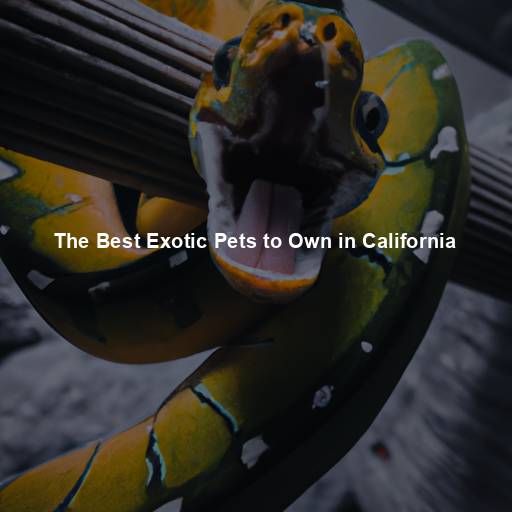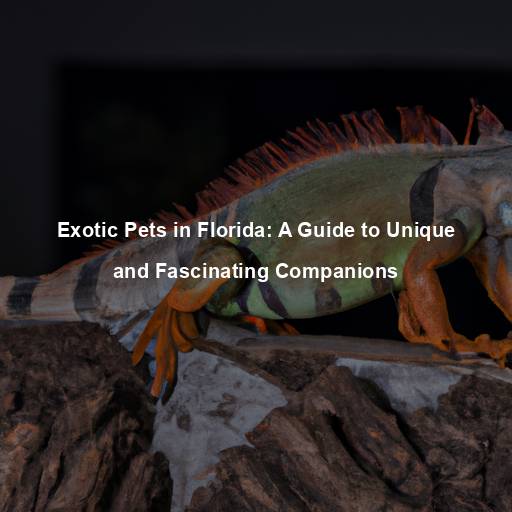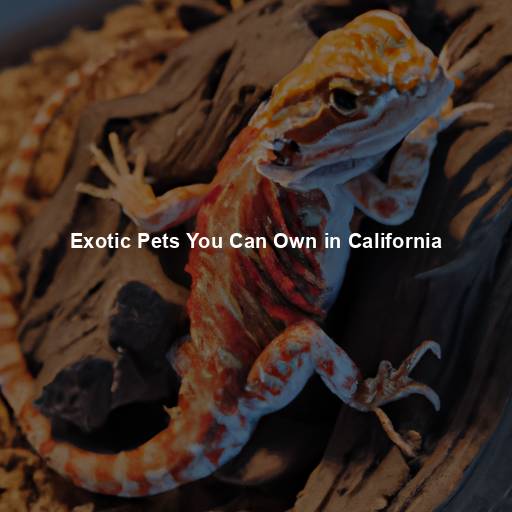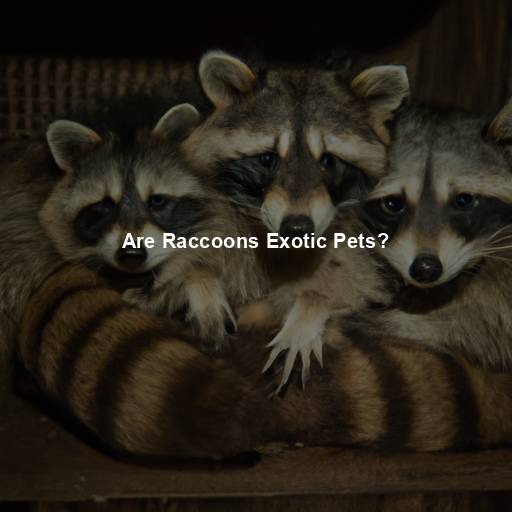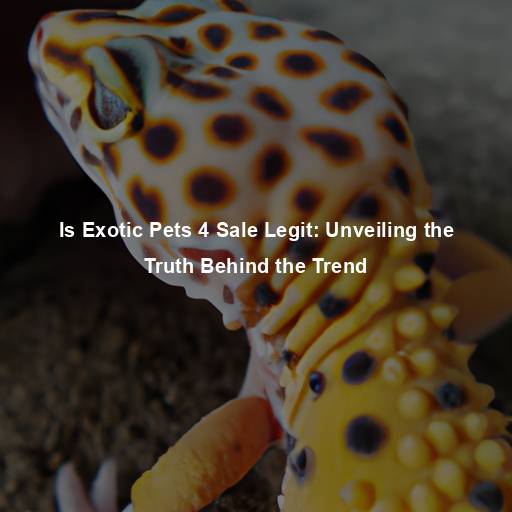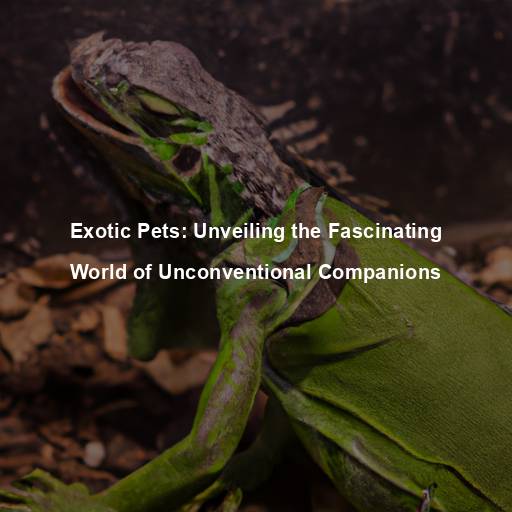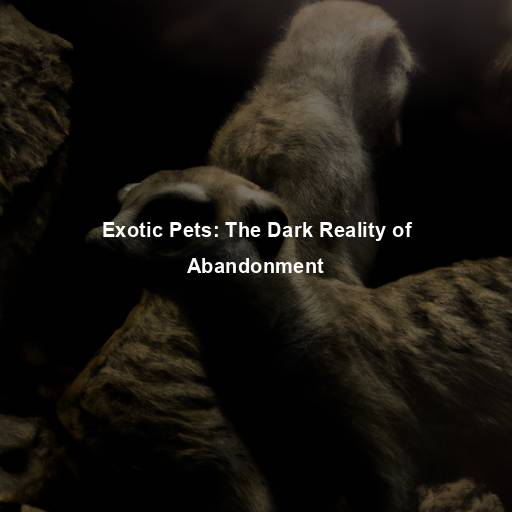The Best Exotic Pets to Own in California
Last Updated on August 3, 2023 by Evan
California, with its diverse climate and vibrant wildlife, is a haven for pet enthusiasts seeking to add a touch of the extraordinary to their lives. While traditional pets like dogs and cats hold a special place in our hearts, there is a growing fascination with exotic pets in the Golden State. From colorful reptiles to unique avian companions, California offers a variety of options for those seeking an unconventional pet experience. In this article, we will explore the best exotic pets to own in California, shedding light on their care requirements, legal considerations, and the joys they can bring to our lives.
Contents [hide]
- 1 Fascinating Felines: Bengal Cats
- 2 Captivating Chameleons: Panther Chameleons
- 3 Avian Elegance: Eclectus Parrots
- 4 Exquisite Invertebrates: Tarantulas
- 5 Unconventional Companions: Sugar Gliders
- 6 Exotic Elegance: Peacock Mantis Shrimp
- 7 Enigmatic Reptiles: Blue-Tongued Skinks
- 8 Exotic Canine Companions: Wolfdogs
- 9 Mythical Beauties: Bearded Dragons
- 10 FAQs for the topic: Best Exotic Pets to Own in California
- 10.1 What are considered the best exotic pets to own in California?
- 10.2 Are there any restrictions or regulations on owning exotic pets in California?
- 10.3 Do I need a permit or license to own an exotic pet in California?
- 10.4 What other factors should I consider before owning an exotic pet in California?
- 10.5 Are there any risks associated with owning exotic pets in California?
- 10.6 Can I release an exotic pet into the wild in California if I can no longer care for it?
Fascinating Felines: Bengal Cats
With their mesmerizing coat patterns that echo the untamed beauty of their ancestors, Bengal cats have emerged as a captivating choice for feline aficionados craving a touch of the exotic. Their lively and spirited temperament injects a burst of energy into any household, ensuring endless entertainment for all. Nevertheless, navigating the world of Bengal cat ownership can be as perplexing as untangling a web of endless possibilities. To keep these enchanting creatures content, be prepared for a repertoire of interactive play sessions and abode enhancements that cater to their innate need for adventure.
Legal Considerations
If you’re considering adding a delightful Bengal cat to your household in California, there are a few things you need to keep in mind. While these feline beauties are generally permitted in most parts of the state, it’s important to understand that different regions may have their own unique regulations. Taking the time to educate yourself on the specific rules and permissions in your local area will ensure that you can enjoy the purrs and adventures of a Bengal cat while staying on the right side of the law.
Captivating Chameleons: Panther Chameleons
For reptile enthusiasts, Panther Chameleons offer a captivating and colorful pet option. Native to Madagascar, these reptiles are renowned for their ability to change their skin coloration. Panther Chameleons require a specialized habitat that mimics their natural environment, complete with live plants, UVB lighting, and misting systems to maintain proper humidity levels. Providing a balanced diet of gut-loaded insects, such as crickets and mealworms, is crucial for their health and well-being.
Avian Elegance: Eclectus Parrots
Enter the enchanting world of Eclectus parrots, those captivating creatures with their vivid plumage and amiable personalities, perfect for avid bird fans. These highly intelligent beings thrive on social interaction and mental challenges, making them the ideal companions. To ensure their well-being, it is imperative to create a spacious abode complete with interactive playthings, and regular freedom beyond the confines of their cage. And let’s not forget their nutrition – a wholesome blend of fresh fruits, vegetables, and top-notch pellets is the secret to preserving their resplendent feathers and optimal health.
Exquisite Invertebrates: Tarantulas
For those captivated by the captivating realm of eight-legged creatures, tarantulas offer an unparalleled and intriguing adventure as pets. The vibrant state of California proudly hosts a remarkable array of tarantula species, each with their own beguiling allure and captivating grace. Indulging in a tarantula ownership calls for an artfully crafted terrarium, complete with the perfect blend of substrate, cozy nooks, and a delicately positioned water dish. When it comes to their dietary preferences, these fascinating arachnids thrive on a diet primarily composed of lively insects, including the likes of crickets and roaches.
Unconventional Companions: Sugar Gliders
There’s a curious craze sweeping the world, captivating hearts and perplexing minds alike – the sugar glider phenomenon. These enchanting creatures, hailing from the vast Australian outback, have made their way into the homes of the adventurous few. With their adorable looks and uncanny sociability, it’s no wonder these nocturnal marvels have found themselves in the spotlight of the exotic pet world. To accommodate these little acrobats, we are faced with the puzzle of constructing an abode that mirrors their wild habitat: a vast enclosure adorned with climbing ropes and enchanting hideaways, fit for their wild escapades under the moonlit sky.
Exotic Elegance: Peacock Mantis Shrimp
If you’re captivated by the enchanting realm of marine life and yearning to infuse your aquarium with an extraordinary charm, the peacock mantis shrimp emerges as a captivating contender. Renowned for its resplendent hues and unparalleled prowess in hunting, this enigmatic creature promises an awe-inspiring spectacle. But hold your seahorses! Before you immerse yourself in this audacious venture, it’s imperative to fathom that these flamboyant marvels necessitate a meticulously crafted marine abode, replete with steadfast water parameters, well-appointed hideaways, and harmonious tank companions.
Enigmatic Reptiles: Blue-Tongued Skinks
Experience the enigmatic allure of blue-tongued skinks, fascinating creatures hailing from awe-inspiring Australia and mystical Indonesia, who will effortlessly steal your heart as they unveil their vibrant blue tongues and display their gentle demeanor. To ensure their contentment, these exceptional reptiles necessitate an ample living space, featuring a meticulously crafted temperature gradient and the presence of UVB lighting, as well as a suitable substrate that accommodates their inherent affinity for burrowing. Maintaining their well-being is a delicate dance, as their diet encompasses a diverse array of nutrient-rich vegetables and tantalizing fruits, occasionally supplemented with nature’s tiny warriors or even a tantalizing hint of cooked meat.
Care Requirements
Madagascar hissing cockroaches are relatively easy to care for. They require a spacious enclosure with adequate ventilation, a substrate that retains moisture, and hiding spots such as bark or cardboard tubes. These roaches are primarily herbivorous and thrive on a diet of fresh fruits, vegetables, and commercial roach chow. It’s important to provide a shallow water dish for hydration, and regular misting of the enclosure to maintain humidity.
Exotic Canine Companions: Wolfdogs
If you’re in search of a one-of-a-kind furry friend, look no further than wolfdogs. These incredible creatures are the result of breeding domestic dogs with different wolf subspecies, creating a mesmerizing mix of traits. But, it’s essential to proceed with care and comprehend the intricate requirements that come with owning a wolfdog. Explore the enigmatic world of these captivating hybrids cautiously!
Care and Challenges
Wolfdogs require a specialized environment that mimics their natural habitat. They need a large, secure outdoor enclosure with high fences to prevent escape, as they retain some of the wild instincts of their wolf ancestors. Wolfdogs have specific socialization and training requirements, necessitating early and consistent socialization efforts. They may also have specific dietary needs, as they require a high-quality, protein-rich diet.
Mythical Beauties: Bearded Dragons
There’s just something about bearded dragons that bewitches and bewilders us. Indigenous to the vast lands of Australia, these enchanting creatures have cast a spell on pet lovers with their captivating presence. From their curious beards, adorned with spiky scales that seem to defy explanation, to their calm and docile nature, bearded dragons have stolen the hearts of reptile enthusiasts worldwide. Whether you’re an aficionado or a novice, caring for these beguiling reptiles is a breeze, making them an irresistible choice for anyone seeking a truly mesmerizing companion.
FAQs for the topic: Best Exotic Pets to Own in California
What are considered the best exotic pets to own in California?
Step into the wild world of exotic pets in California, where legality and regulations reign supreme. Delve into the intriguing realm of small-sized wonders like sugar gliders, hedgehogs, and ferrets, adorned with the necessary permits, of course. But the intrigue does not end there; reptiles like bearded dragons, geckos, and select snake species capture the hearts of those seeking a touch of the extraordinary. Yet, tread with caution, for each adventurer must diligently navigate the labyrinth of specific requirements and legalities before embracing these captivating creatures.
Are there any restrictions or regulations on owning exotic pets in California?
Yes, owning exotic pets in California is regulated by state and local laws to protect both the animals and the public. It is illegal to own any exotic pet species that is listed as a restricted or prohibited animal under California law. Some examples of restricted species include large cats such as lions, tigers, and cheetahs, as well as primates like chimpanzees and monkeys. Moreover, it is vital to check if any specific city or county ordinances exist, as they may impose further restrictions or require permits for certain exotic pet species.
Do I need a permit or license to own an exotic pet in California?
Yes, many exotic pet species require permits or licenses to be legally owned in California. The specific requirements vary depending on the species and can differ between cities and counties as well. It is essential to contact the appropriate agencies and verify the regulations applicable to the desired exotic pet before acquiring one. Neglecting to obtain the necessary permits may result in penalties or the removal of the animal.
What other factors should I consider before owning an exotic pet in California?
Thinking about bringing an exotic pet into your California home? Hold on a sec! There’s a whole bundle of factors to consider before diving into this colorful adventure. Ready for some serious soul-searching? Let’s start with the commitment you’ll need to give, both in terms of time and resources, to keep your chosen species happy and healthy. But that’s not all – you’ve gotta make sure there are skilled vets and savvy specialists nearby who can handle those wild moments. Oh, and don’t forget about the environment – what happens if your furry friend does a runner or slips out by accident? Finally, can you provide the ultimate oasis for your new pal, like proper digs, tasty eats, and plenty of excitement? Are you up for the challenge? It’s time to weigh your options. May the wild wonders await!
Are there any risks associated with owning exotic pets in California?
Owning exotic pets in California is a whirlwind of uncertainties and perplexities. These captivating creatures, with their majestic allure, may ensnare us in a web of enigma. Hidden within their mesmerizing beauty lies a labyrinth of risks, shrouded by the mysterious allure of zoonotic diseases that can stealthily infiltrate our existence. The path to caring for these captivating beings is riddled with obstacles, as their unique dietary cravings and intricate environmental demands become a tangled maze of perplexities, potentially causing the delicate balance of their health to crumble. In this bewildering journey, knowledge becomes our guiding light, beckoning us to embark on a quest of thorough research, seeking wisdom from exotic pet experts and veterinarians, in order to navigate the treacherous terrain and ensure the well-being of both owner and creature alike.
Can I release an exotic pet into the wild in California if I can no longer care for it?
It’s a well-known fact that setting free exotic pets in California is totally against the law and, quite frankly, a really bad idea. The aftermath of such a thoughtless act can throw the local ecosystem into chaos, wreaking havoc on the poor native critters and completely throwing off the delicate balance of nature. Let’s be smarter about this – if you find yourself unable to care for your exotic pet anymore, why not do the right thing and find a reputable exotic animal sanctuary or a loving new home where their unique needs can be met with utmost care and responsibility?

